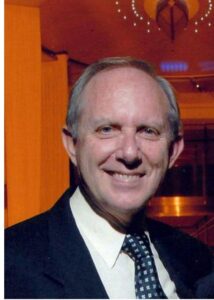“The real test is not whether you avoid this failure, because you won’t. It’s whether you let it harden or shame you into inaction, or whether you learn from it; whether you choose to persevere.”
— Barack Obama
In my own life, I have found that failure isn’t always due to a lack of perseverance but is often due to a lack of direction. Running 100 m/h in the wrong direction is more counterproductive than standing still. For many of us, restricted access to vital information is the greatest barrier between where we are and where we desire to be. In this interview, Dr. Pyser shares a few dental practice management strategies that all dentists could immediately implement in their dental practice in order to effect positive change. However, before we dive in, let’s take a moment to get to know Dr. Pyser.
MEET DR. JERRY PYSER

Jerry Pyser, DDS, is a licensed sales associate with over 40 years of experience in the dental profession. For twenty years, Dr. Pyser worked as a private-practice practitioner in Fort Lauderdale, Florida. Dr. Pyser also has extensive expertise in community-based dentistry. Under his leadership as Dental Executive Director for the Highlands County Health Department in Sebring, FL, Dr. Pyser developed and implemented strategies and systems that resulted in the rapid growth and development of three Sebring County dental clinics. Today, approximately 90 children are treated daily at those clinics.
Currently, Dr. Pyser is the CEO of A.I.M.M. Management and Marketing, a company dedicated to training physicians and dentists on practice management. As a consummate educator, Dr. Pyser now uses his expertise to help dentists achieve their professional goals through practice transitions and sales.
Dr. Pyser received his undergraduate B.A. degree from Hartwick College, Oneonta, New York, and his DDS degree from Temple University, Philadelphia, PA.
Dental Practice Management Strategies Interview with Dr. Pyser:
Topic: The Most Critically Needed Skills in Dentistry
Dr. Pyser’s Answer:
Relationship building is one of the most essential skills that all leaders need to develop. Ultimately, it will take a village to develop a solid team to achieve our goals. Furthermore, once we have developed and established solid, trusting relationships, all other skillsets can be shared with others.
Topic: Personality and the Dentist
Dr. Pyser’s Answer:
The profession of dentistry attracts various personality types. Additionally, being gregarious does not always correlate with being liked. How others perceive you is a rather complex topic. However, a patient’s affinity for you is often impacted by his or her past experiences. So, although you would want everyone to like you, being liked is not always possible! As such, you should build your team with varied personality types. Doing so will then increase your chances of having “someone for everyone” when it comes to the “likeability scale.”
Topic: Developing Trust in a Dental Office
Dr. Pyser’s Answer:
Trust is built by honing your communication skills. Becoming a student of communication is essential. Moreover, developing strong listening abilities is a major skill to learn in order to build trust. This is true whether you are addressing patients’ treatment outcomes or fostering a staff member’s career path in your practice. When developing trust, it’s important that you are able to talk openly about any worries, doubts, and concerns. Doing so will help you earn your patients and staff’s trust and, in turn, will solidify your relationships moving forward.
If employees don’t trust each other or their managers, collaboration and communication stagnate. Employee engagement drops. Productivity falls. The workplace becomes unpleasant, even toxic.
Trust is about predictability. It is perhaps the most basic tenet of social behavior. The more predictable someone is, the more you know them. The more you know a person, the more you like them. This is true in both personal and business life.
Topic: The Impact of Ambiance on Patient Perception
Dr. Pyser’s Answer:
Colors, clutter, space, light, and even smells all play important roles in setting the ambiance for your practice. A patient’s impression of your practice begins the minute they come through the door. You want every “visitor” to feel welcomed. Therefore, be certain to pay close attention to how you are “setting the stage” for the welcome!
Topic: Tips for Increase Case Acceptance
Dr. Pyser’s Answer:
There are five methodical steps to use so that you and your patients know they have received the best exam. Briefly, these 5 steps are:
- Highlight positive areas.
- Address areas of concern.
- Discuss prognosis.
- Review the diagnosis.
- Present the recommended treatment.
A clear consultation format, following the above five points, will always ensure that all relevant issues have been discussed. Being organized in this manner will also confirm that the patient has a clear understanding of the findings and treatment. Before exiting the treatment room, always make sure to review all the steps slowly and distinctly to clarify any misunderstandings. Ask the patient once again if they have any further questions about the course of treatment.
Topic: Final Tips for Dentist in Various Stages of Their Careers
Dr. Pyser’s Answer:
The new dentist
Become a student of communication. Learn how to effectively interconnect with patients, staff, and others.
Dentists who are just hitting their career stride
Focus on leadership skills rather than management skills! By the time you have hit your career stride, many of the management responsibilities should have already been handed off to a staff manager. Shifting the focus to the development of leadership skills will enable the continuous growth of your practice.
The dentist, who has been practicing for some time but is still trying to find his or her footing
Now might be the time to explore other options. Hiring an outside source to conduct a needs assessment could provide valuable insight.
The dentist who has been doing so long that they are practically on autopilot
If you are on autopilot and you continue to have a passion for your professions, explore novel ways to apply your skillsets (e.g., public health, new technologies, etc.). If you are on autopilot and wish to go beyond clinical dentistry, perhaps it is time to speak with a transition specialist and begin your exit strategy!
To listen to the full interview, please check out our podcast.
-END-
Similar Blogs
Performing Due Diligence When Purchasing a Dental Practice
